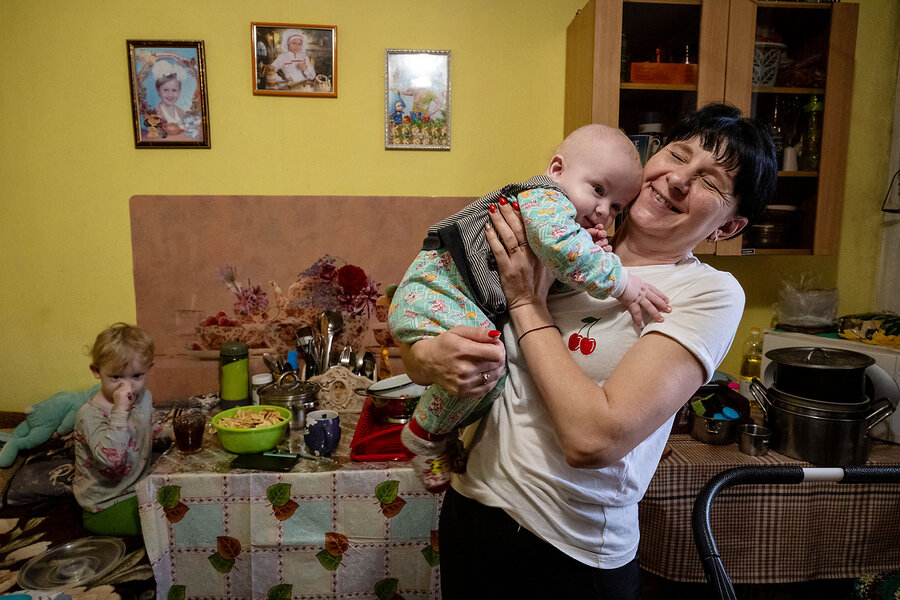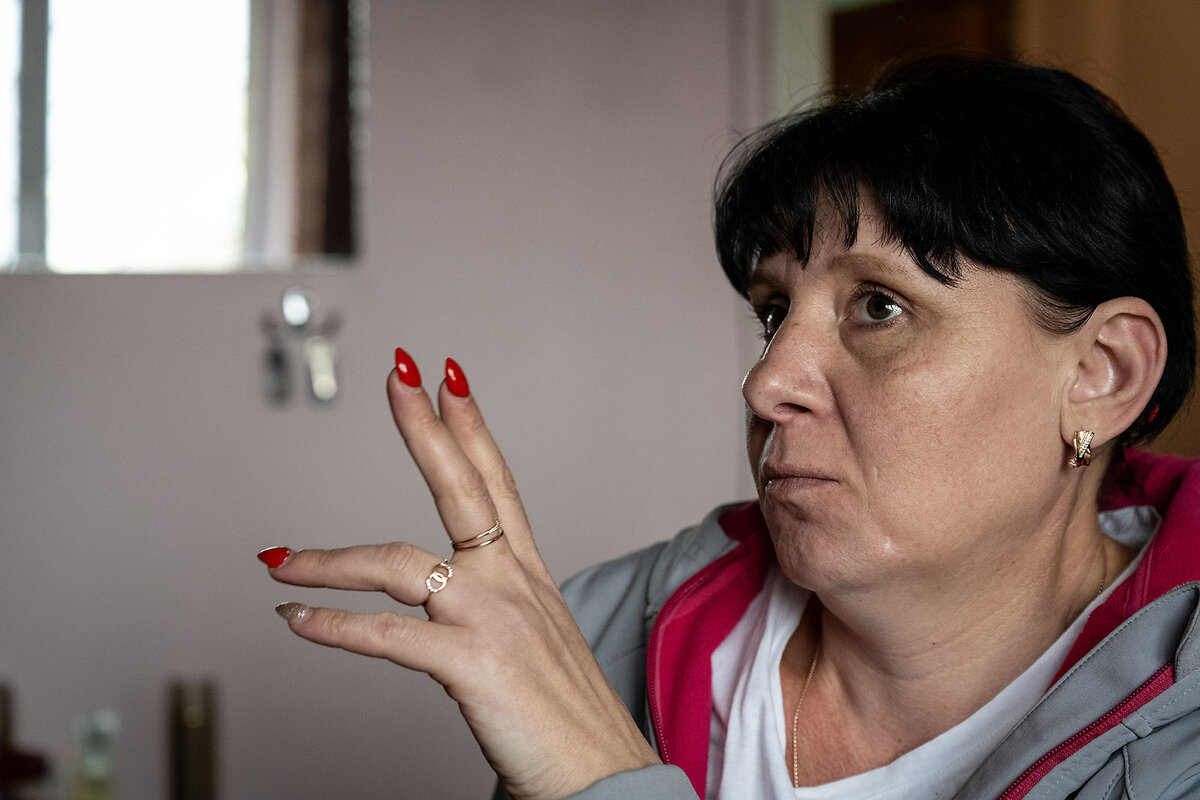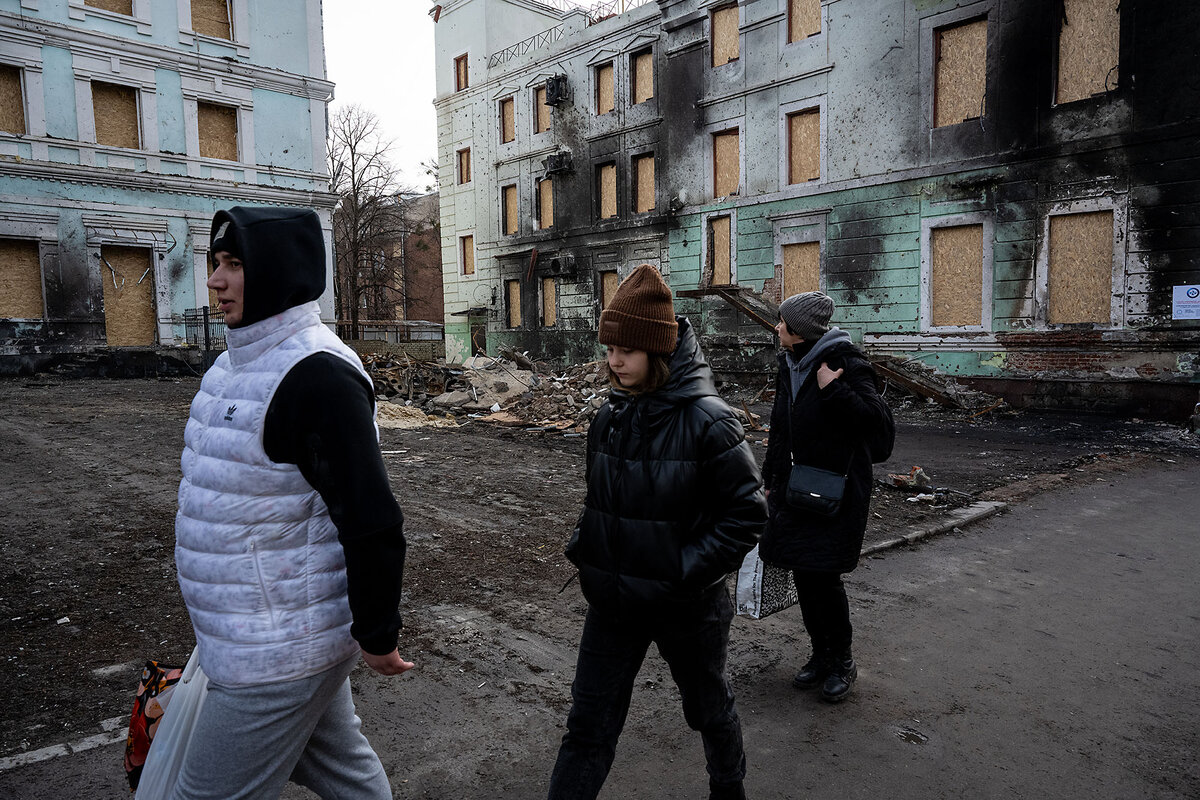Amid Western aid cuts, Ukraine families wonder how they’ll get by
Loading...
| KHARKIV, Ukraine
A budget crunch has brought new levels of uncertainty to the two cramped rooms of a student dormitory in Kharkiv.
There, Ukrainian mother Olha Poltoratska and her four children have been surviving on monthly payments provided to Ukrainians displaced by the war.
For most, those payments are now ending.
Why We Wrote This
A story focused onWith billions of dollars in additional U.S. aid to Ukraine held up in Congress for months, the impact is being felt not only by soldiers at the front, but also by civilians displaced by war and dependent on generosity.
“I can’t imagine how I can live without that,” says Ms. Poltoratska, whose son, Ruslan, is 9 months old, has two teeth, and has a taste for the Ukrainian staple, beetroot borscht.
“When I heard that news, I was amazed,” says the distraught mother. “I called my husband and said, ‘What are we going to do? Join the army to get money?’”
Ukraine relies on foreign aid for half of its annual budget, and months of continuing delays in American approval of a $60 billion military and support package for Ukraine is cutting deep, from a shortage of artillery shells on the battlefield to severe reduction in services.
The European Union in late February passed its own delayed package of $54 billion for Ukraine, for 2024 to 2027, which includes some $42 billion in direct budget support. Japan also gave $440 million in the first two months of the year, also for budget support.
But the uncertain Western cash flow to Ukraine has forced a broad belt-tightening, even as Russia’s invasion grinds into its third year and Russian forces go on the offensive.
Ms. Poltoratska first held her breath when Ukraine’s cash-strapped government announced that modest support payments to the legions of internally displaced people (IDPs) would end Feb. 1.
For her, that would have meant losing roughly $50 each for her and her two older daughters, and $75 each for her two small children – a total of some $300 per month. They would then have to get by on $120 per month – the official payment to all mothers of four children.
The cutoff was delayed until March 1, but today Ms. Poltoratska is still holding her breath, unsure if new rules that would continue payments to the most vulnerable people will include her family.
Prices are high, for everything from diapers to vegetables, which they used to grow for themselves on their own plot in Kucherivka, a battle-scarred town just miles from Ukraine’s increasingly noisy northeastern front-line.
Both sides of her family, for three generations, worked at the nearby railroad hub, which is now destroyed. Ms. Poltoratska’s husband has stayed in the town, at the edge of territory liberated by Ukraine in a September 2022 counteroffensive, where he does volunteer work with occasional payment as a mechanic fixing military vehicles.
“Sometimes he comes here, so we don’t forget what he looks like,” says Ms. Poltoratska, who asked that his name not be used for his security. Two rooms in the converted student dormitory hang with drying laundry and are stuffed with cooking tools, a TV, and whatever else could be brought from home.
When the Russians were advancing in early 2022, the first shell to land in Kucherivka exploded in their front yard. Last August, after Russia stepped up air attacks on nearby Kupiansk and Ukrainian soldiers warned of the risk to the children, the family finally left for Kharkiv – Ukraine’s second-largest city, just 25 miles from the Russian border and itself a frequent target of rockets and missiles.
“If we believe what our government says to us, this money will be redirected to the army,” says Ms. Poltoratska. She is not certain, though, that that is where it goes. Her older daughter, Lisa, had been in contact with a soldier from Lyman who told her that for three months in a row, the bulk of his $3,000 monthly salary had been delayed, and that he had instead received a tiny fraction of it.
“Is this normal?” Ms. Poltoratska asks.
For this family and so many others, the cash for IDPs has been a critical lifeline.
“How can you leave these people with nothing?” asks Valentyna Idrisova, who refurbished this student dormitory after it had been abandoned for two years in northwest Kharkiv. She calls the dorm her “personal combat zone” and says it now accommodates 178 displaced Ukrainians, including 28 children.
Donations poured in after the sanctuary was open to IDPs last August, but they began to dry up in November, says Ms. Idrisova. Most of the temporary residents are retirees who receive a monthly pension of $60, she says, and live on that until the IDP payment comes.
“That’s how it goes,” she says. “This is crucial money for them.”
Indeed, Ukrainian officials say that 40% of the displaced people depend entirely on state financial assistance for sustenance. But the cut in IDP payments – which reportedly aims to save $530 million of Ukraine’s annual budget – is just one facet of a broader financial shriveling, which partly stems from delayed Western support.
“Financial aid from the United States is crucial for maintaining macro-financial stability during the war,” Ukrainian Finance Minister Sergii Marchenko tweeted in mid-February, after the Senate approved a long-delayed $60 billion aid package for Ukraine, which included $7.85 billion in direct budget support.
Still, the House has delayed its own vote, with Republicans tying the issue to domestic immigration measures.
In Kharkiv, officials suggest that local budgets may shrink 40% this year. In a region that experienced widespread destruction during the invasion, then months of occupation and the Ukrainian counteroffensive, rebuilding depends on foreign cash – and, of course, the course of the war.
Anton Korotovskykh, director of the Department of Architecture and City Development for the Kharkiv region, lists a string of projects that have been identified for restoration.
“But because Kharkiv is so close to the Russian border and there is shelling every day, most of these projects are in the aspirational phase,” he says. “The main challenge is refurbishing private residences, because people want to go back.”
Last year some 1,500 buildings, including multistory residential complexes, were restored. But with 50,000 buildings and homes damaged or destroyed in the region, “it is going to be a long job,” he says.
“Of course, the biggest challenge is our big and reckless neighbor, which keeps destroying things,” says Mr. Korotovskykh. “So we focus on critical infrastructure like heating and electricity.”
The lack of resources is so profound, for example, that the fund for rebuilding destroyed roads “now is 0.0 – there is nothing,” he says. “We have expectations that this year we will have less for this, because we understand that the entire state budget is put into the military.”
Rebuilding must be done in a holistic way, such that those who might move back to refurbished homes also have schools, hospitals, and other facilities like bomb shelters for children, Mr. Korotovskykh adds.
“Of course we have our fears” about a shrinking or cutoff of Western aid, he says. “We can’t talk of rebuilding without finance.”
Reporting for this story was supported by Oleksandr Naselenko.








